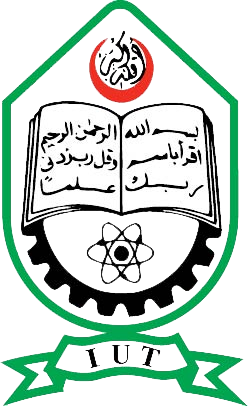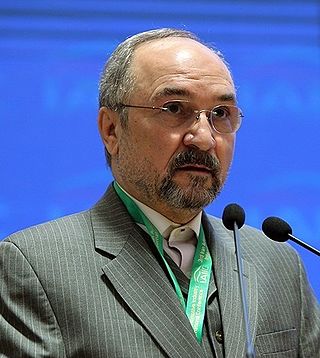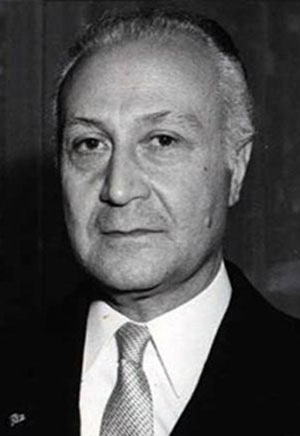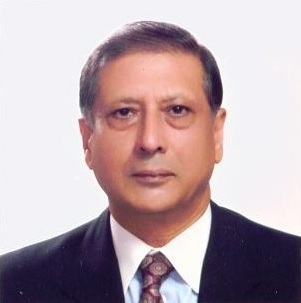
The Organisation of Islamic Cooperation, formerly the Organisation of the Islamic Conference, is an intergovernmental organization founded in 1969, consisting of 57 member states, with 48 being Muslim-majority countries. The organisation states that it is "the collective voice of the Muslim world" and works to "safeguard and protect the interests of the Muslim world in the spirit of promoting international peace and harmony".

The Economic Cooperation Organization or ECO is an Asian political and economic intergovernmental organization that was founded in 1985 in Tehran by the leaders of Iran, Pakistan, and Turkey. It provides a platform to discuss ways to improve development and promote trade and investment opportunities. The ECO is an ad hoc organisation under the United Nations Charter. The objective is to establish a single market for goods and services, much like the European Union. After the dissolution of the Soviet Union, the ECO expanded to include Afghanistan, Azerbaijan, Kazakhstan, Kyrgyzstan, Tajikistan, Turkmenistan, and Uzbekistan in 1992.

The Moro National Liberation Front is a political organization in the Philippines that was founded in 1972. It started as a splinter group of the Muslim Independence Movement. The MNLF was the leading organization among Moro separatists for about two decades beginning from the 1970s.

Ekmeleddin Mehmet İhsanoğlu is a Turkish academic, diplomat and politician who was Secretary-General of the Organisation of Islamic Cooperation (OIC) from 2004 to 2014. He is also an author and editor of academic journals and advocate of intercultural dialogue.

Islamic University of Technology, commonly known as IUT, is an private international university located in Gazipur, Bangladesh. IUT offers undergraduate and graduate programs in Engineering and Technical Education. It is the only international Engineering university in Bangladesh.

Azzeddine Laraki was a politician who served as Prime Minister of Morocco from 30 September 1986 to 11 August 1992. He was the 10th prime minister of Morocco and served under king Hassan II. He was Secretary General of the Organisation of the Islamic Conference (OIC) from 1997 to 2000. He was the first Moroccan official to hold that position.

International Islamic Fiqh Academy is an international Islamic institution for the advanced study of Islamic jurisprudence and law based in Jeddah, Saudi Arabia. It was founded following a resolution by the Third Islamic Summit Conference of the Organization of Islamic Cooperation, held in Mecca, that called for the establishment of an Islamic Fiqh Academy. The International Islamic Fiqh Academy was established in June 1983 as a subsidiary organ of the Organization of Islamic Cooperation. It consists of 57 member states and representatives.

Nanguyalai Tarzi – was a high-ranking Afghan diplomat who was the Afghan Ambassador to Switzerland and Permanent Representative to the United Nations office and other international organisations in Geneva. Tarzi has been the Ambassador of Afghanistan to India, and before that he was Permanent Representative to United Nations at Geneva and Afghan Ambassador to Switzerland, Ambassador of Afghanistan to Pakistan and Director of the United Nations Information Centres (UNIC) in Tehran, Iran. From 1980s to 1990s, Tarzi was Permanent Observer of Organisation of Islamic Cooperation (OIC) to the United Nations, Geneva, Switzerland and United Nations, Vienna, Austria and Senior Political Adviser and Deputy Permanent Observer of OIC to the United Nations, New York, United States of America. In the 1970s, Tarzi was the Afghan Diplomat in Washington D.C., United States of America.
The following lists events that happened during 1994 in Afghanistan.

Mohammad Khazaee is the former Ambassador of Iran to the United Nations. He presented his credentials to the United Nations Secretary-General Ban Ki-moon in July 2007. He was elected as Vice President of the United Nations General Assembly on 14 September 2011.

Nasrollah Entezam was a diplomat, politician, and minister, as well as Iranian Ambassador to the United States and France. He was the first Iranian Ambassador to the United Nations from 1947 to 1950 and President of the UN General Assembly during its fifth session in 1950.

Abbas Ali Khalatbari, also known as Abbas Ali Khal'atbari, was an Iranian diplomat, who served as the minister of foreign affairs from 1971 to 1978. He was among the significant diplomats who shaped the foreign relations of Iran during the reign of Mohammad Reza Pahlavi. He is one of the Shah era politicians who were executed following the Iranian revolution.

Javid Husain, is a Diplomat, from the Foreign Service of Pakistan, who has had a distinguished career during which he served as the Ambassador of Pakistan to the Netherlands (1992–1995), the Republic of Korea (1995–1997) and Iran (1997–2003). During his tenure at Tehran, he was also the Pakistan Permanent Representative to the Economic Cooperation Organization (ECO).

Hossein Amir-Abdollahian is an Iranian politician, diplomat and current foreign minister of Iran. He was formerly the deputy foreign minister for Arab and African Affairs from 2011 to 2016.
In 1991, Azerbaijan joined the Organisation of Islamic Cooperation and started to build relations with the organization. As a result, the ambassador of Azerbaijan to Saudi Arabia was given a mandate of permanent representative of Azerbaijan to the General Secretariat of the OIC in May 1994.
Ahmad Sobhani is a retired Iranian diplomat who previously served as Iran's ambassador to Venezuela (2001–06) and Gabon (1995–98), in addition to chargé d'affaires in Armenia (1993–94). He also served as the deputy foreign minister for European and American Affairs under Manouchehr Mottaki (2007–10).
Masoumeh Aghapour Alishahi is a lecturer and Iranian politician.

The Secretary General of the Organisation of Islamic Cooperation, is the chief administrative officer of the Organisation of Islamic Cooperation (OIC) and the head of the General Secretariat and other organs of the OIC. A secretary general is elected by the recommendation of the OIC Council of Foreign Ministers from the 57 member states for a renewable term of five years.

Islamic Summit of the Organisation of Islamic Cooperation is one of the five highest decision-making bodies of the OIC, the other four being the OIC Council of Foreign Ministers, Standing Committees, Executive Committee, and the International Islamic Court of Justice. The Islamic Summit is a principle organ of the OIC focused on formulation, development, and implementation of decisions made by 57 member states. The Summit is attended by the concerned heads of state such as prime ministers, presidents, emirs and other equivalent heads.

The Charter of the Organisation of Islamic Cooperation, commonly known as OIC Charter, is the foundational treaty of the Organisation of Islamic Cooperation. Its foundational principles are based on 18 chapters that objectively maintains the purpose, focus, functions, and foundation of the OIC, an intergovernmental organization founded in 1969. The charter was formally signed on 25 September 1969 by the 57 member states, including 5 observer states. However, it was revised by the 11th summit held in Dakar, Senegal on 14 March 2008.














